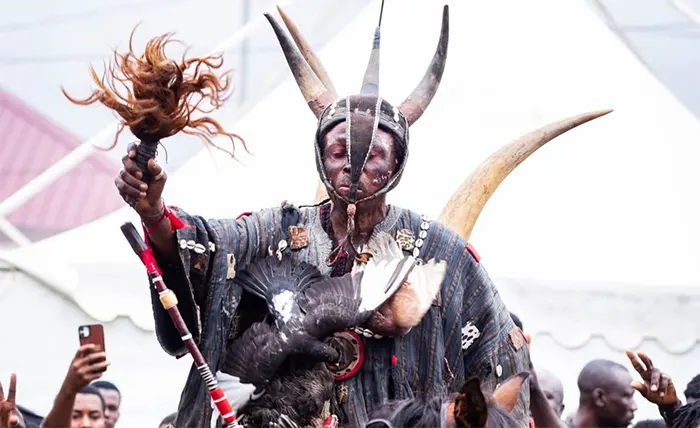The funeral rites of the Asantehemaa, Nana Ama Konadu Yiadom III, witnessed a remarkable convergence of tradition, spirituality, and spectacle. The four-day ceremony, held at the Manhyia Palace in Kumasi, drew a multitude of mourners and participants, including scores of fetish priests from across the Asante Kingdom and beyond. These spiritual leaders, revered for their perceived supernatural powers and their role in guiding the community’s spiritual well-being, played a significant role in the elaborate funeral proceedings. Their presence underscored the deep-rooted spiritual beliefs and traditions that remain integral to Asante culture. Among this assembly of spiritual figures, one individual, Kwaku Bonsam, commanded particular attention.
Kwaku Bonsam, a renowned fetish priest from Akomadan Afrancho in the Ashanti Region, made a grand entrance that captivated the assembled crowd. His attire was nothing short of extraordinary, a striking visual representation of his spiritual authority. He donned a smock adorned with live birds on the front and imposing horns at the back, a symbolic display of his connection to the natural and spiritual realms. Atop his head, he wore an elaborate headgear, further amplified by large horns, adding to his already commanding presence. Riding a horse, he became the focal point of the gathering, his arrival heralded by chants of “Kofi, Kofi, Kofi,” the name of his deity. This vibrant display of traditional garb and ceremonial practice highlighted the significance of fetish priests within the Asante Kingdom.
The crowd’s enthusiastic response to Kwaku Bonsam’s arrival underscored the deep respect and reverence accorded to fetish priests in Asante society. Their perceived connection to the spiritual realm, their ability to intercede with deities, and their role in guiding traditional practices imbue them with a significant social and cultural standing. As Kwaku Bonsam rode through the funeral grounds, the air buzzed with excitement and anticipation. The mourners, drawn by his unique attire and the aura of spiritual power he projected, pressed forward to catch a glimpse of the renowned fetish priest. Their chants and cheers echoed through the palace grounds, creating an atmosphere charged with both solemnity and celebration.
Beyond his eye-catching appearance, Kwaku Bonsam’s actions further amplified the sense of ceremony and tradition. Responding to the enthusiastic welcome, he engaged with the crowd, dancing to traditional Asante music from his horseback perch. This display of both spiritual gravitas and engagement with the community further cemented his position as a respected figure within the Asante tradition. Dismounting his horse, he greeted the assembled chiefs, a gesture of respect that acknowledged the established hierarchies within the kingdom. This interplay between personal charisma and adherence to traditional protocols illustrated the complex social dynamics at play within the Asante community.
The prominence of fetish priests in Asante culture is rooted in a rich history that intertwines spiritual belief with political power. The historical figure of Komfo Anokye, a powerful fetish priest, played a pivotal role in the founding of the Asante Kingdom. His spiritual guidance and perceived supernatural abilities were instrumental in assisting Opemsuo Osei Tutu I, the first Asantehene, in consolidating power and establishing the kingdom in the 17th century. This historic connection between spiritual leadership and political authority continues to shape the role and influence of fetish priests within Asante society. Their participation in significant events like the Asantehemaa’s funeral underscores their continued importance in maintaining cultural and spiritual continuity.
The presence and performance of Kwaku Bonsam at the Asantehemaa’s funeral served as a compelling reminder of the enduring power of tradition and spiritual belief within Asante society. His elaborate attire, his interactions with the crowd, and the reverence with which he was received highlighted the significant role that fetish priests continue to play in the cultural and spiritual life of the Asante people. The event, both a solemn occasion of mourning and a vibrant celebration of tradition, underscored the complex tapestry of beliefs and practices that define Asante identity. Kwaku Bonsam’s participation served as a living embodiment of this tradition, demonstrating the ongoing relevance of spiritual leaders in a rapidly changing world.


